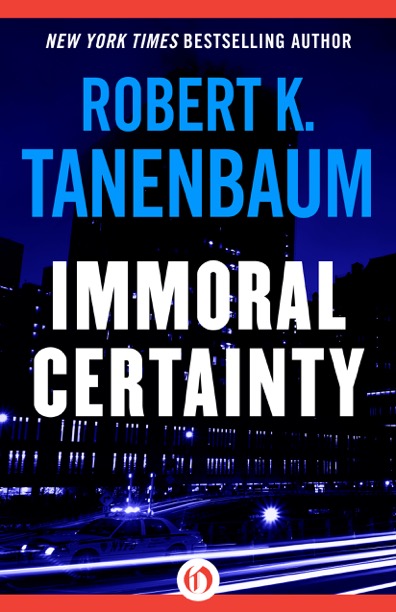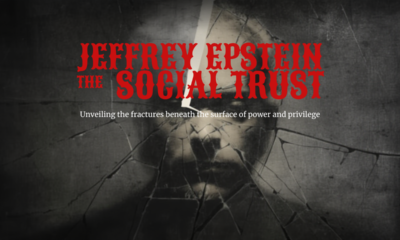Reviews
Immoral certainty, abhorrent acts

Immoral Certainty. By Robert K. Tanenbaum. Dutton Co., 1991. Re-issue: Open Road Media, 2010.
Moral and immoral certainty
Again Robert K. Tanenbaum, former Chief of Homicide for the New York County DA’s office, discusses a chilling subject. He introduces it with a legal phrase fraught with meaning, but which needs explaining. But this time he uses a play on such a phrase.
Moral certainty, in criminal law, is a state of mind for a trier of fact – usually a jury. A morally certain juror can judge a man guilty in good conscience. In general, a morally certain person knows he or she has made no mistake. He or she need accept no blame, even if he or she did make a mistake.
So what can immoral certainty mean? Tanenbaum explains. Immoral certainty means knowing that, no matter what immoral thing you did, no one will ever call you to account. An immorally certain person holds himself or herself above the laws of man and God. Such people also think they’ve “covered all the bases.” None can suspect them; indeed none dare suspect them. So they make the most dangerous criminals any prosecutor might ever come across.
In this disturbing story, Tanenbaum’s central character deals with people having this immoral certainty. Three of them form the worst nuclear family he hopes he’ll ever see. The rest are the clients of the matriarch of this family. And what is her stock-in-trade? Children. Some of these children, their parents entrust to her care. Others, one of her sons grooms and snatches off the street.
Hiding within corrupt institutions
But the true source of this matriarch’s immoral certainty is her affiliation with a respectable institution. Before Tanenbaum’s hero finishes, he will find this person lurking within New York City’s Catholic Church. Worse yet, she will have priests—and judges and other “respectable citizens”—as clients. So her immoral certainty comes from her privileged position, and a network of protectors.
Furthermore, she cherishes a delusion that her other son, while not taking part in her particular crimes, will someday come to great power. For in fact, she doesn’t merely prostitute children, but also sacrifices some of them—literally—to Satan. She thinks this other son will benefit from Satan’s power, if she appeases him with enough such blood sacrifices. Accordingly she cheerfully gets him out of whatever trouble he falls into. As a result, he burglarizes, defrauds, and even murders with absolute impunity. Until at last one prosecutor decides he will bring them all to book. And he will do this, no matter how much immoral certainty they delude themselves with—or can make real.
All this shows the passion that drives Tanenbaum. His passion for the law, one can see in his career. But here, and in his other works, he shows another passion. Many, many people work under such immoral certainty as these villains show. And they cloak themselves behind and within many respectable institutions and professions, including the law itself. Tanenbaum lives to expose such people—or to expose such kinds of people. Look carefully at these high-minded places, he warns on every page. You never know what dark deeds go on there. The inner room, or the dark cellar, one should fear more than the dark alley. For there the dark deeds go on where one least expects them.
Minor points
Tanenbaum’s prose suffers—though one can debate this—from a decision he made early in his writing and never changed. He writes in an omniscient, ever shifting, point of view. A good scenarist could turn that easily into a movie treatment. But the author always has a problem. Sometimes he must withhold information about the memories and motives of the character having the point of view. By convention, a novelist usually shares everything from the head of the point-of-view character, and nothing from the head of any other.
But this also goes to the tension between mystery and suspense. Mystery means why events fall out as they do. That includes who did the deed, and how, and what else did he do. Suspense means: will someone stop an evil person from killing another person—or killing any more people? An author has to tell just enough so the reader will know the threat, and the target. Few authors balance mystery and suspense as well as Tanenbaum does.
Still current
Tanenbaum, as he did in two earlier works, writes about a subject current when he wrote it, or at least fresh in the public mind. To write a novel that still gives a reader chills, long after the subject is no longer current, is a great achievement. Tanenbaum does this in Immoral Certainty. Except this subject is still current, though in a slightly different sense. Sexual scandal has touched the Roman Catholic Church, in real life. (And scarcely a single archdiocese may have escaped the scandal.)
More to the point, we all need to examine critically all institutions that ask us to trust them. That need will stay current. Tanenbaum sharply reminds of that here. Presumably he has done it twenty-six times already, and won’t stop.
Terry A. Hurlbut has been a student of politics, philosophy, and science for more than 35 years. He is a graduate of Yale College and has served as a physician-level laboratory administrator in a 250-bed community hospital. He also is a serious student of the Bible, is conversant in its two primary original languages, and has followed the creation-science movement closely since 1993.
-

 Civilization4 days ago
Civilization4 days agoWhy Europe Shouldn’t Be Upset at Trump’s Venezuelan Actions
-

 Executive5 days ago
Executive5 days agoHow Relaxed COVID-Era Rules Fueled Minnesota’s Biggest Scam
-

 Christianity Today4 days ago
Christianity Today4 days agoSurprising Revival: Gen Z Men & Highly Educated Lead Return to Religion
-

 Civilization5 days ago
Civilization5 days agoThe End of Purple States and Competitive Districts
-

 Executive4 days ago
Executive4 days agoWaste of the Day: Can You Hear Me Now?
-

 Civilization2 days ago
Civilization2 days agoTariffs, the Supreme Court, and the Andrew Jackson Gambit
-

 Civilization2 days ago
Civilization2 days agoWhy Europe’s Institutional Status Quo is Now a Security Risk
-

 Civilization3 days ago
Civilization3 days agoDeporting Censorship: US Targets UK Government Ally Over Free Speech










